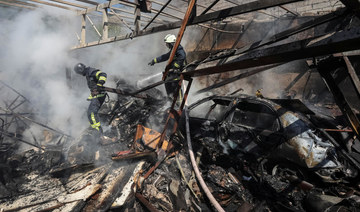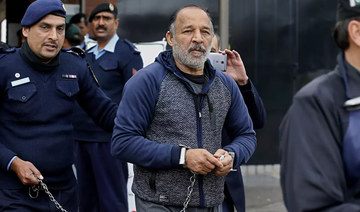COLLEYVILLE, Texas: Authorities on Sunday identified a 44-year-old British national as the man who took four people hostage at a Texas synagogue for 10 hours before an FBI SWAT team stormed the building, ending a tense standoff that President Joe Biden called “an act of terror.”
Malik Faisal Akram was shot and killed after the last of the hostages got out at around 9 p.m. Saturday at Congregation Beth Israel near Fort Worth. In a statement, the FBI said there was no indication that anyone else was involved, but it didn’t provide a possible motive.
Akram could be heard ranting on a Facebook livestream of the services and demanding the release of a Pakistani neuroscientist who was convicted of trying to kill US Army officers in Afghanistan. The FBI and police spokeswomen declined to answer questions Saturday night about who shot Akram when the standoff ended.
Video from Dallas TV station WFAA showed people running out a door of the synagogue, and then a man holding a gun opening the same door just seconds later before he turned around and closed it. Moments later, several rounds of gunfire could be heard, followed by the sound of an explosion.
“Rest assured, we are focused,” Biden said during a visit to a food pantry in Philadelphia on Sunday morning. “The attorney general is focused and making sure that we deal with these kinds of acts.”
Biden said the suspect was able to purchase weapons on the street and may have only been in the country a few weeks. US Immigration and Customs Enforcement did not immediately respond to questions Sunday about Akram’s immigration status and history.
London’s Metropolitan Police said in a statement that its counter-terrorism police were liaising with US authorities about the incident.
FBI Special Agent in Charge Matt DeSarno said the hostage-taker was specifically focused on an issue not directly connected to the Jewish community, and there was no immediate indication that the man was part of any broader plan. But DeSarno said the agency’s investigation “will have global reach.”
It wasn’t clear why Akram chose the synagogue.
Law enforcement officials who were not authorized to discuss the ongoing investigation and who spoke to The Associated Press on the condition of anonymity earlier said the hostage-taker demanded the release of Aafia Siddiqui, a Pakistani neuroscientist suspected of having ties to Al-Qaeda who is in a federal prison in Texas. He also said he wanted to be able to speak with her, according to the officials, one of whom confirmed that the hostage-taker was a British national.
A rabbi in New York City received a call from the rabbi believed to be held hostage in the synagogue to demand Siddiqui’s release, a law enforcement official said. The New York rabbi then called 911.
Police were first called to the synagogue around 11 a.m. and people were evacuated from the surrounding neighborhood soon after that, FBI Dallas spokeswoman Katie Chaumont said.
Saturday’s services were being livestreamed on the synagogue’s Facebook page for a time. The Fort Worth Star-Telegram reported that an angry man could be heard ranting and talking about religion at times during the livestream, which didn’t show what was happening inside the synagogue.
Shortly before 2 p.m., the man said, “You got to do something. I don’t want to see this guy dead.” Moments later, the feed cut out. A spokesperson for Meta Platforms Inc., the corporate successor to Facebook Inc., later confirmed that Facebook had removed the video.
Multiple people heard the hostage-taker refer to Siddiqui as his “sister” on the livestream. But John Floyd, board chair for the Houston chapter of the Council on American-Islamic Relations, — the nation’s largest Muslim advocacy group — said Siddiqui’s brother, Mohammad Siddiqui, was not involved.
“This assailant has nothing to do with Dr. Aafia, her family, or the global campaign to get justice for Dr. Aafia. We want the assailant to know that his actions are wicked and directly undermine those of us who are seeking justice for Dr. Aafia,” said Floyd, who also is legal counsel for Mohammad Siddiqui. “We have confirmed that the family member being wrongly accused of this heinous act is not near the DFW Metro area.”
Texas resident Victoria Francis told the AP that she watched about an hour of the livestream before it cut out. She said she heard the man rant against America and claim he had a bomb.
“He was just all over the map. He was pretty irritated and the more irritated he got, he’d make more threats, like ‘I’m the guy with the bomb. If you make a mistake, this is all on you.’ And he’d laugh at that,” she said. “He was clearly in extreme distress.”
Francis, who grew up near Colleyville, tuned in after she read about the hostage situation. She said it sounded like the man was talking to the police department on the phone, with the rabbi and another person trying to help with the negotiations.
Colleyville, a community of about 26,000 people, is about 15 miles (23 kilometers) northeast of Fort Worth. The synagogue is nestled among large houses in a leafy residential neighborhood that includes several churches, a middle and elementary school and a horse farm.
By Sunday morning, the police perimeter around the synagogue had shrunk to half a block in either direction and FBI agents could be seen going in and out of the building. A sign saying “Love” — with the “o” replaced with a Star of David — was planted in a neighbor’s lawn.
Congregation Beth Israel is led by Rabbi Charlie Cytron-Walker, who has been there since 2006 as the synagogue’s first full-time rabbi. He has worked to bring a sense of spirituality, compassion and learning to the community, according to his biography on the temple’s website, and he loves welcoming everyone, including LGBT people, into the congregation.
In a Sunday morning post on what appears to be Cytron-Walker’s Facebook page, the rabbi thanked law enforcement and first-responders. “I am grateful we made it out. I am grateful to be alive,” he wrote.
Rabbi Andrew Marc Paley of Dallas, who was called to the scene to help families and hostages upon their release, said Cytron-Walker acted as a calm and comforting presence who was responsive to the instructions given to him. The first hostage was released shortly after 5 p.m. That was around the time food was delivered to those inside the synagogue, but Paley said he did not know if the food delivery was part of the negotiations.
“He appeared a little unfazed, actually, but I don’t know if that was sort of shock or just the moment,” Paley said of the first hostage after his release. “He was calm and grateful to law enforcement and Rabbi Charlie.”
Israeli Prime Minister Naftali Bennett said on Twitter that he had been monitoring the situation closely. “This event is a stark reminder that antisemitism is still alive and we must continue to fight it worldwide,” he wrote. He said he was “relieved and thankful” that the hostages were rescued.
The standoff prompted increased security in other places, including New York City, where police said that they increased their presence “at key Jewish institutions” out of an abundance of caution.
Aafia Siddiqui earned advanced degrees from Brandeis University and the Massachusetts Institute of Technology before she was sentenced in 2010 to 86 years in prison on charges that she assaulted and shot at US Army officers after being detained in Afghanistan two years earlier. The punishment sparked outrage in Pakistan among political leaders and her supporters, who viewed her as victimized by the American criminal justice system.
In the years since, Pakistani officials have expressed interest publicly in any sort of deal or swap that could result in her release from US custody, and her case has continued to draw attention from supporters. In 2018, for instance, an Ohio man who prosecutors say planned to fly to Texas and attack the prison where Siddiqui is being held in an attempt to free her was sentenced to 22 years in prison.
British national ID’d as hostage-taker at Texas synagogue
https://arab.news/9upuu
British national ID’d as hostage-taker at Texas synagogue
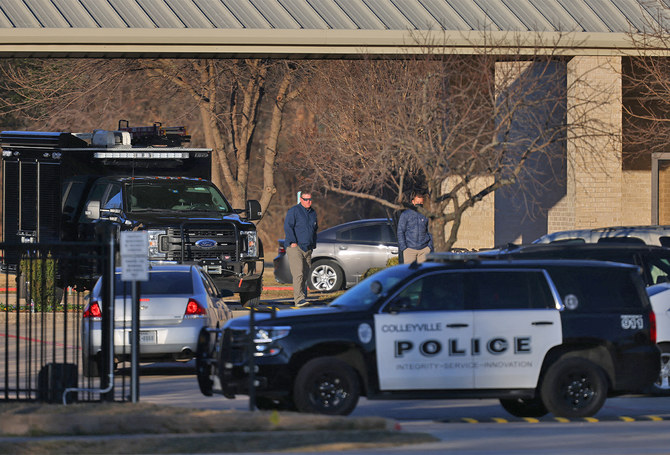
- Malik Faisal Akram was shot and killed after the last of the hostages got out
- Hostage-taker demanded the release of Pakistani neuroscientist Dr. Aafia Siddiqui
Drone footage shows devastation in Ukraine’s strategic eastern city of Chasiv Yar as Russians near
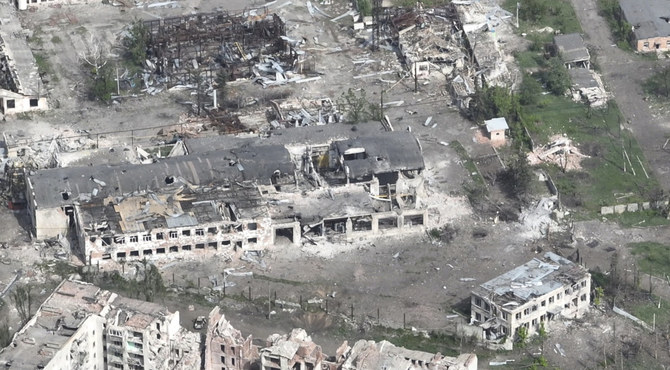
- The destruction is reminiscent of the cities of Bakhmut and Avdiivka, which Ukraine yielded after months of bombardment and huge losses for both sides
- Russia launched waves of assaults against Chasiv Yar’s outnumbered defenders as Ukraine's US and European allies dilly-dallied on sending fresh supplies
KYIV, Ukraine: Months of relentless Russian artillery pounding have devastated a strategic city in eastern Ukraine, new drone footage obtained by The Associated Press shows, with barely a building left intact, homes and municipal offices charred and a town that once had a population of 12,000 now all but deserted.
The footage shows Chasiv Yar — set amid green fields and woodland — pounded into an apocalyptic vista. The destruction is reminiscent of the cities of Bakhmut and Avdiivka, which Ukraine yielded after months of bombardment and huge losses for both sides.
The strategically important city has been under attack by Russian forces for months. Capturing it would give Russia control of a hilltop from which it can attack other cities that form the backbone of Ukraine’s eastern defenses.
That would set the stage for a potentially broader Russian offensive that Ukrainian officials say could come as early as this month.
Russia launched waves of assaults on foot and in armored vehicles at Chasiv Yar’s outnumbered Ukrainian troops, who have run desperately short of ammunition while waiting for the US and other allies to send fresh supplies.
Rows of mid-rise apartment blocks in Chasiv Yar have been blackened by blasts, punched through with holes or reduced to piles of timber and masonry. Houses and civic buildings are heavily damaged. The golden dome of a church remains intact but the building appears badly damaged.
No soldiers or civilians were seen in the footage shot Monday and exclusively obtained by the AP, apart from a lone man walking down the middle of a road between wrecked structures.
Regional Gov. Vadym Filashkin said Wednesday on Ukrainian TV that 682 residents have held on in Chasiv Yar, living in “very difficult conditions.” The city had a pre-war population of over 12,500. Filashkin said that those remaining have lacked running water and power for over a year, and that it is “ever more difficult” for humanitarian aid to reach them.
The destruction underscores Russia’s scorched-earth tactics throughout more than two years of war, as its troops have killed and displaced thousands of civilians.
NATO Secretary-General Jens Stoltenberg acknowledged Monday that the delayed delivery of allies’ military aid to Ukraine had left the country at the mercy of the Kremlin’s bigger and better-equipped forces.
Ukraine and its Western partners are racing to deploy critical new military aid that can help check the slow but steady Russian advance as well as thwart drone and missile attacks.
Elsewhere, Ukrainian authorities reported that two civilians died and at least nine others, included an 11-year-old boy, were wounded Wednesday after Russian aerial guided bombs pummeled a village in the northeastern Kharkiv region.
According to Gov. Oleh Syniehubov, a 64-year-old man and 38-year-old woman — both locals — were killed after one of the bombs detonated near their car in Zolochiv, some 20 kilometers (12 miles) from the border with Russia.
In the southern Black Sea port of Odesa, at least 13 people were wounded after a Russian ballistic missile slammed into the city late Wednesday, regional Gov. Oleh Kiper said in a Telegram update. He did not say what had been hit, but reported the blast had sparked a major fire.
Videos circulating on social media showed huge plumes of smoke rising skywards at the site. Nova Poshta, a large Ukrainian postal and courier company, said in a Facebook post Wednesday that one of its sorting depots had been struck, but claimed no employees were among those hurt.
Odesa has been a frequent target for Russian firepower, with eight civilians killed by Russian missiles in the city over the past two days.
UK police officer charged with showing support for Hamas

- Mohammed Adil, from Bradford in northern England, was arrested last November and charged following an investigation
- Adil, a police constable, has been suspended from his job with West Yorkshire Police and is due to appear in court on Thursday
LONDON: A British police officer has been charged with a terrorism offense for allegedly publishing an image in support of Hamas, a group banned in Britain as a terrorist organization, police said on Wednesday.
Mohammed Adil, 26, from Bradford in northern England, was arrested last November and charged following an investigation by British counter-terrorism officers, Counter Terrorism Policing North East said in a statement.
The police watchdog, the Independent Office for Police Conduct (IOPC), said the inquiries had focused on messages shared on WhatsApp which had concluded the case should be referred to prosecutors.
“On Monday, PC Mohammed Adil, 26, was charged with two counts of publishing an image in support of a proscribed organization, specifically Hamas, contrary to section 13 of the Terrorism Act,” the IOPC statement said. “The offenses are alleged to have taken place in October and November 2023.”
Adil, a police constable, has been suspended from his job with West Yorkshire Police and is due to appear before London Westminster Magistrates’ Court on Thursday.
Since the Oct. 7 attacks by Hamas on Israel, police have arrested and charged a number of people at pro-Palestinian protests in London for showing support for the group, while counter-terrorism commanders say they have also had a large amount of online content referred to them.
Family of 7-year-old girl trampled on boat while crossing Channel feared repatriation to Iraq

- Sara Alhashimi was crushed to death when a large group of men rushed onto an overloaded inflatable dinghy she had boarded with her parents and 2 siblings
- Her father says his family was told they were to be deported to his home country of Iraq after living in Europe for 14 years
LONDON: A seven-year-old Iraqi girl was crushed to death in a small, overcrowded boat as her family, who feared repatriation to Iraq after years living in Europe, attempted to cross the English Channel from France to the UK, the Guardian reported on Wednesday.
Sara Alhashimi was with her father Ahmed Alhashimi, mother Nour Al-Saeed, 13-year-old sister Rahaf and 8-year-old brother Hussam when they boarded an inflatable dinghy at Wimereux, south of Calais, last Tuesday.
But Alhashimi, 41, said that as it set sail, a large group of men rushed onboard and he lost his grip on his daughter. Unable to move because of the crush, he could not reach her and she was trampled. Four other people also died.
Alhashimi said he left Basra around 2010 after he was threatened by an armed group. Sara, his youngest child, was born in Belgium. The family had also lived in Sweden and submitted asylum applications to several EU countries but all were rejected. Their attempt to cross the channel last week was their fourth in two months since arriving in the Pas de Calais region, after police prevented the previous crossings.
Alhashimi told the BBC: “If I knew there was a 1 percent chance that I could keep the kids in Belgium or France or Sweden or Finland I would keep them there.
“All I wanted was for my kids to go to school. I didn’t want any assistance. My wife and I can work. I just wanted to protect them and their childhoods and their dignity.”
Smugglers promised a guaranteed place on a boat carrying 40 migrants for €1,500 ($1,600) per adult and €750 per child, Alhashimi said.
Sara was calm, he added, as he held her hand while they walked from a railway station and then hid in dunes overnight while waiting to board their vessel. The smugglers told the group to inflate the boat shortly before 6 a.m., carry it toward the shore and run as they approached the water.
As they did so, however, a teargas canister thrown by police went off beside them, Alhashimi said, and Sara began to scream. He had been carrying her on his shoulders but once inside the dinghy he put her down so he could help daughter Rahaf get onboard.
As he tried to reach Sara in the increasingly overcrowded boat, Alhashimi said he begged a Sudanese man, who had joined them at the last minute, to get out of the way. He even punched the man, with little effect.
“I just wanted him to move so I could pull my baby up,” he said. “That time was like death itself … We saw people dying. I saw how those men were behaving. They didn’t care who they were stepping on — a child, or someone’s head, young or old. People started to suffocate.
“I could not protect her. I will never forgive myself. But the sea was the only choice I had.”
Alhashimi said was only able to reach Sara after French rescuers had arrived at the boat and removed some of the 112 people onboard.
“I saw her head in the corner of the boat,” he said. “She was all blue. She was dead when we pulled her out. She wasn’t breathing.”
Belgium recently rejected an asylum claim by the family on the grounds that Basra was a safe place for them to return to. They had spent the past seven years living with a friend in Sweden.
“Everything that happened was against my will,” said Alhashimi. “I ran out of options. People blame me and say, ‘how could I risk my daughters?’ But I’ve spent 14 years in Europe and have been rejected.”
Colombia to cut diplomatic ties with Israel

- “Tomorrow (Thursday) diplomatic relations with the state of Israel will be severed... for having a genocidal president,” Petro told a May Day rally in Bogota
- Petro, Colombia’s first leftist president, has also asserted that “democratic peoples cannot allow Nazism to reestablish itself in international politics“
BOGOTA: Colombian President Gustavo Petro said Wednesday his country will sever diplomatic ties with Israel, whose leader he described as “genocidal” over its war in Gaza.
“Tomorrow (Thursday) diplomatic relations with the state of Israel will be severed... for having a genocidal president,” Petro, a harsh critic of the devastating war against Hamas, told a May Day rally in Bogota.
Petro has taken a critical stance on the Gaza assault that followed an unprecedented Hamas attack on southern Israel on October 7 — which resulted in the deaths of some 1,170 people, mostly civilians, according to Israeli figures.
In October, just days after the start of the war, Israel said it was “halting security exports” to Colombia after Petro accused Israeli Defense Minister Yoav Gallant of using language about the people of Gaza similar to what the “Nazis said of the Jews.”
Petro, Colombia’s first leftist president, has also asserted that “democratic peoples cannot allow Nazism to reestablish itself in international politics.”
In February, Petro suspended Israeli weapons purchases after dozens of people died in a scramble for food aid in the war-torn Palestinian territory — an event he said “is called genocide and recalls the Holocaust.”
In the October attack, Hamas militants also took about 250 hostages, 129 of whom remain in Gaza, including 34 Israel says are presumed dead.
Israel’s retaliatory offensive has killed at least 34,568 people in Gaza, mostly women and children, according to the health ministry in the Hamas-run territory.
UK auction house removes Egyptian skulls from sale after outcry
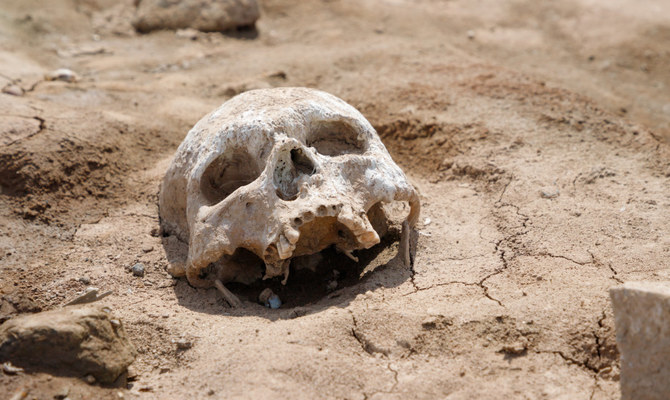
- Lawmaker condemns trade as ‘gross violation of human dignity’
- Items were part of collection owned by English archaeologist Augustus Pitt Rivers
LONDON: A UK auction house has removed 18 ancient Egyptian human skulls from sale amid condemnation by a member of Parliament, The Guardian reported.
Labour MP Bell Ribeiro-Addy said the sale of human remains for any purpose should be outlawed and described the trade as a “gross violation of human dignity.”
Semley Auctioneers in Dorset had listed the skulls with a guide price of £200-£300 ($250-$374) for each lot. The collection included 10 male skulls, five female and three of an uncertain sex.
Some of the skulls were listed as coming from Thebes and dating back to 1550 B.C.
They were originally collected by Augustus Henry Lane Fox Pitt Rivers, an English soldier and archaeologist who established the Pitt Rivers Museum in Oxford, which contains about 22,000 items.
After being housed at a separate private museum on his estate, the skulls were sold as part of a larger collection to his grandson, George Pitt Rivers, who was interned during the Second World War for supporting fascist leader Oswald Mosley.
Ribeiro-Addy said: “This despicable trade perpetuates a dark legacy of exploitation, colonialism and dehumanization. It is a gross violation of human dignity and an affront to the memory of those whose lives were unjustly taken, or whose final resting places were desecrated.
“We cannot allow profit to be made from the exploits of those who often hoped to find evidence for their racist ideology. It is imperative that we take decisive action to end such practices and ensure that the remains of those who were stolen from their homelands are respectfully repatriated.”
Britain has strict guidelines on the storage and treatment of human remains, but their sale is permitted provided they are obtained legally.
Saleroom, an online auction site, removed the skulls from sale after being contacted by The Guardian. Its website states that human remains are prohibited from sale.
A spokesperson said: “These items are legal for sale in the UK and are of archaeological and anthropological interest.
“However, after discussion with the auctioneer we have removed the items while we consider our position and wording of our policy.”
Prof. Dan Hicks, Pitt Rivers Museum’s curator of world archaeology, said: “This sale from a legacy colonial collection that was sold off in the last century shines a light on ethical standards in the art and antiquities market.
“I hope that this will inspire a new national conversation about the legality of selling human remains.”
Some of the skulls in the auction had been marked with phrenological measurements by the original collector, he said.
“The measurements of heads in order to try to define human types or racial type was something that Pitt Rivers was continuing to do with archaeological human remains in order to try to add to his interpretations of the past.”




